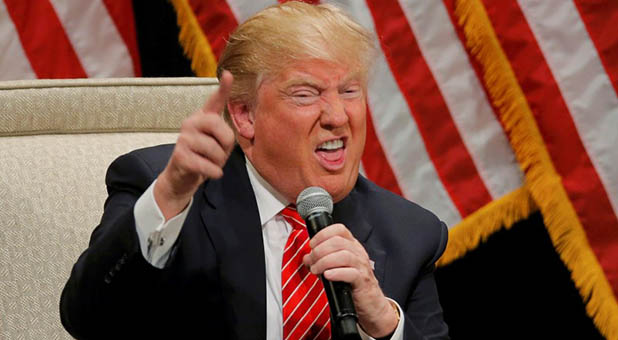Can Donald Trump Actually Win the General Election?
This is not an argument for what should happen or what I’d like to happen in the November presidential election, but about what would likely happen in a Donald Trump versus Hillary Clinton race: Clinton would win, and probably by a wide margin.
I obviously can’t say what will happen with certainty because there are some events that cannot be determined. If Clinton is indicted or there’s a significant terrorist attack, the election dynamics change greatly.
But assuming Clinton is the Democratic candidate and there is no significant terrorist attack before Election Day, can Trump win in November?
I caution Trump supporters: You can’t just say that Trump will win. That claim must be based on evidence and recognized patterns of political behavior. Crowds at rallies and winning primary elections, especially with only a plurality of the vote, is not evidence that a candidate can win in a general election.
Even if you add up everyone who has attended a Trump rally, that’s only a tiny fraction of total voters in a presidential general election. In both 2008 and 2012, there were about 130 million voters in those presidential elections. And the difference between a turnout in a primary and general election is great. For example, Trump won both the South Carolina and Michigan primaries, but in the general election in those states there will likely be twice as many voters as the number that voted in the primary (counting both Republican and Democratic primary voters).
You could look at head-to-head polls to predict an outcome. Real Clear Politics has nearly 50 polls going back several months which polls a Trump vs. Clinton race, and Trump has small leads in only five of those polls over that period. (Rubio and Cruz lead Clinton in far more of those polls.) In the last month, Clinton’s advantage has been just over six percentage points.
But months remain until the election, and there will be barrages of ads trashing candidates. George H. W. Bush trailed Michael Dukakis during 1988, but he then surged ahead late in the campaign. Early polls are not a lock on what will happen after a campaign begins.
So how do people choose whom they are voting for? For those people who identify with a political party, party identification is the most important factor determining a vote. This view is known by political scientists as the American Voter model, and there’s much evidence to support it. For example, in the 2012 race, 92 percent of Democrats supported Obama and 93 percent of Republicans supported Romney. And in 2008 it was similar with 93 percent of Democrats supporting Obama and 93 percent of Republicans supporting McCain. Obama and Romney in 2012 and Obama and McCain in 2008 came very close to splitting the independents in both of those elections. So what was the difference in both of those elections? There were more people who identified as a Democrat than as a Republican (according to Gallup). Right now, according to Gallup, Democrats have only a slight advantage when it comes to party identification, so that’s good news for the eventual Republican nominee.
So if party identification is a very important predictor of voter choice, then the way to victory is to get your party to vote for you, win half or more of the independents and try to peel away some voters from the other party.
But can Trump get nearly all of those who identify as a Republican? Trump is far from universally liked in his chosen party. I can’t think of any candidate in recent history who generates such strong dislike from some members of his party. The “#NeverTrump” campaign is not the work of Democrats or independents. A poll of likely voters in the Ohio Republican primary indicates that 48 percent of those voters approve of Trump and 44 percent disapprove of him. Trump and his supporters can claim that nearly all of the party will come around to support him in the fall, but that seems implausible. Still, assume that most Republicans would come around to support Trump or at least opposing Clinton. Even getting 80 percent of Republicans would put him in a difficult position to win in the fall.
But Trump claims—and Rush Limbaugh affirms—that he’s drawing independents and Democrats. He’s getting some of those voters, but the polling data suggest that it’s going to be very hard for him get enough independents and Democrats to win in the fall. A January poll from Gallup indicated that Trump had the worst favorability ratings among any Republican candidates among independents and Democrats. Trump was net -27 among independents (that is, his unfavorability rating was 27 points higher than his favorability rating) and -70 among Democrats. No other Republican was so far underwater with non-Republicans (Trump’s -97 combined was far worse than Huckabee, Cruz and Bush, who were around -40). It’s not enough to get some independents and Democrats. For Trump to win, he gets a majority of independents and at least 20 percent of Democrats.
Trump, the businessman, should understand you need a plan for winning. When an entrepreneur seeks support for a new venture, he or she has to show how the business idea will attract enough customers. In presidential politics you need a plan for winning a majority of electoral votes because there’s only one winner. Attracting a dedicated minority of voters wins no prize.
The Trump campaign is like one of those outlandish business ideas, like personal travel to the moon, that has some potential customers, but it doesn’t have a winning business plan.
Dr. Michael Coulter is a professor of humanities and political science at Grove City College and a contributor to The Center for Vision & Values.














































